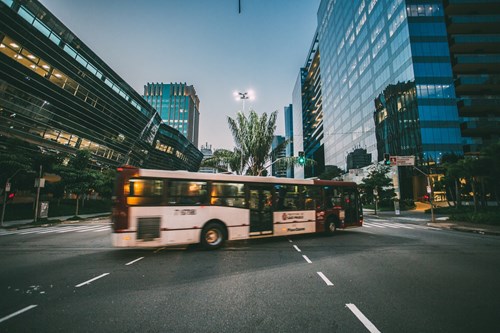
The 60-foot articulated buses are manufactured by New Flyer and use state-of-the-art technologies. The G Line (Orange) in the San Fernando Valley is the first line to receive these electric buses. Today’s deployment is the first of 40 electric buses that will be put into service by the end of 2020
“Even as we confront the immediate challenge of COVID-19, we are making a long-term investment in a healthier, more sustainable future with the delivery of this first electric bus on the G Line,” said Los Angeles Mayor and Metro Board Chair Eric Garcetti. “Every electric vehicle we put on our streets today means lower emissions tomorrow, and we remain fully committed to cleaner transportation options and a better quality of life for all Angelenos.”
The electric buses cost $1.15 million each in a total project valued at $80,003,282. This project includes the deployment of the electric buses and associated charging equipment and infrastructure improvements. The new buses will be capable of recharging at various points along the G Line (Orange) to support its 24/7 operation.
 “Since the early planning stages, and for the last 20 years, I have been supporting Metro’s Orange Line (now the G Line), and I know how much it means to our community,” said Senate Majority Leader Bob Hertzberg. “It has provided premium, high-capacity rapid transit service, while being cost-effective, and has been an ongoing, extraordinary success. I am excited that it now includes the use of innovative, environmentally-friendly equipment like this zero-emission electric bus. We are actively protecting the health of our Valley residents, and the environment, and that’s something we can be proud of.”
“Since the early planning stages, and for the last 20 years, I have been supporting Metro’s Orange Line (now the G Line), and I know how much it means to our community,” said Senate Majority Leader Bob Hertzberg. “It has provided premium, high-capacity rapid transit service, while being cost-effective, and has been an ongoing, extraordinary success. I am excited that it now includes the use of innovative, environmentally-friendly equipment like this zero-emission electric bus. We are actively protecting the health of our Valley residents, and the environment, and that’s something we can be proud of.”
"The Metro G Line is one of Los Angeles' most important lines, connecting the San Fernando Valley in an efficient and effective way," said Los Angeles City Council Member David Ryu. "And soon, in a sustainable way as well. Making our City carbon-free is the critical work over the next decade, and I'm proud to see it start in the Valley with a fully electric G Line by the end of the year. When you prioritize a carbon-free future, you can make it happen - that's what Metro is proving here today."
The Metro Board in 2017 unanimously adopted a motion endorsing a comprehensive plan to transition the agency to a 100 percent zero emission bus fleet by 2030. Metro is the largest American transportation agency to endorse such a goal. The plan is contingent upon two primary factors: continuous advancements in electric bus technology – which includes an increase in range, reduction of charging times and extension of battery life cycles – as well as a drop in price as the technology develops
“We are excited to begin operating electric buses as part of Metro’s bus fleet and look forward to achieving our goal of converting the G Line to all electric buses,” said Metro CEO Phillip A. Washington. “As we continue to enhance the customer experience and improve our bus system through the NextGen Bus Plan, we will continue to make sustainable practices the norm.”
Under separate contracts, Metro ordered an additional 65 zero emission electric buses from the manufacturer BYD with five of those buses being 60-foot articulated buses earmarked for the G Line (Orange) and the remainder to be used on the J Line (Silver) that operates between the El Monte Bus Station and the Harbor Gateway Transit Center in Gardena. Metro plans to convert the J Line (Silver) to zero emission electric buses in 2021.
About Metro
.png) The Los Angeles County Metropolitan Transportation Authority (Metro) is currently providing lifeline service for essential trips and frontline workers. Metro continues building the most ambitious transportation infrastructure program in the United States and is working to greatly improve mobility through its Vision 2028 Plan.
The Los Angeles County Metropolitan Transportation Authority (Metro) is currently providing lifeline service for essential trips and frontline workers. Metro continues building the most ambitious transportation infrastructure program in the United States and is working to greatly improve mobility through its Vision 2028 Plan.




Comments
There are no comments yet for this item
Join the discussion